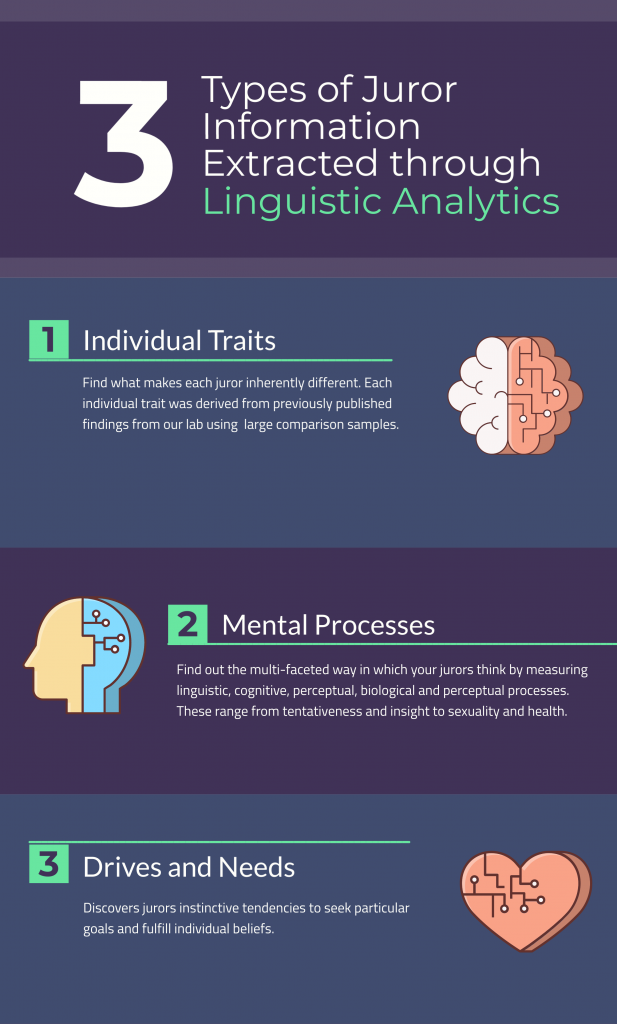Having the best voir dire questions goes a long way to ensuring higher verdicts.

By employing the best voir dire questions, you reward yourself and your client with the most advantageous jury possible. The more advantageous the jury duty is, the better your chances of winning larger awards will be. That’s why sample jury selection questions is so critical and why many highly respected trial attorneys swear their cases are won or lost in the voir dire stage.
Billy Beane turned the business world upside down using data and analytics. From Major League Baseball, the Moneyball revolution spread across all professional sports and into totally unrelated industries. Now even law firms are getting into the data game.
For years, we have used big data, predictive modeling, and Artificial Intelligence to help plaintiffs and promote consumer advocacy. Our proprietary methodology was developed using the proven strategies of award-winning trial attorneys. In addition to applying data analytics to jury selection and voir dire strategies, we have developed our own virtual jury service and research platform that offers client-specific pre-litigation research (for example, assessment of damages and / or case value research) up to the moment you have a seated jury.
Our technology-driven process includes applications, infrastructure, and best practices that enable optimal decisions for analyzing data. From this analysis, we present actionable information to help lawyers, consultants, and other trial team members make informed business decisions.
Today we are going to highlight one of our latest advances in the SJQ (Supplemental Juror Questionnaire) process: Text analysis for personality profiling.
Text Analysis for Personality Profiling
In today’s technological world, there is a proliferation of information, and the smartphone revolution has made it inescapable. Twitter, Facebook, Netflix, Reddit, Hulu, Instagram, Amazon, Google—it’s hard to synthesize it all. It’s no surprise, therefore, that people are suffering from “Information overload.”
According to Bertram Gross, the term’s inventor, “Information overload occurs when the amount of input to a system exceeds its processing capacity. Decision-makers have fairly limited cognitive processing capacity. Consequently, when information overload occurs, it is likely that a reduction in decision quality will occur.”
It is a testament to Dr. Gross’s prophetic wisdom that he coined the expression back in 1964. Imagine if he could see the streaming wars today! (Fun fact: David Jonathan Gross, Bertram’s son, was awarded the 2004 Nobel Prize in Physics.)
We included the last detail about Bertram’s son because it perfectly encapsulates the Google-it, 24/7 information overload moment in time and space that we are all currently occupying together. You didn’t need to know about Bertram’s brainy son, but now you know, and when the question comes up during your next trivia night, you’ll thank us.
To frame it another way, today’s challenge is no longer accessing information, but determining its quality. It’s easy to be overwhelmed by information overload, but there is a silver lining to this cloud (at least when it comes to your next big case). Research in psychology provides insights into how we can obtain deeper underlying meanings from the text data available to us in spoken and written form. These data are incredibly valuable to trial attorneys during the jury selection process.
By scrutinizing the SJQs and social media profiles of your potential jurors through text analysis, we can more accurately measure the psychographics of your jury candidates. By better understanding their psychographics, you will be in a position to pose the best voir dire questions examples possible, which will result in a more favorable jury and a more favorable outcome for you and your client. A win-win.
To gain the most accurate and high-quality information from the available data, new methodologies have been developed to obtain, process and apply the data. An emerging methodology to maximize information and processing efficiency is an automated analysis of language, or text analysis. (1-4)

What is text analysis?
Text analysis uses computer language algorithms to extract psychological features of what we say. Written text is processed through a text analysis program that uses data dictionaries to code the valence (positivity / negativity) and intensity of the text.
Data dictionaries are a bank of words associated with a particular theme, for example, words that define “self-reflection.” Analyzing the content of language and the meaning behind human communication can uncover implicit processes or aspects of our thinking styles and personalities that are unknown to us or intentionally or unintentionally hidden. (4)
By analyzing and coding this text data according to algorithms that expose deeper psychological meanings, we are able to get in the head of your potential jurors so that you can select your client’s dream jury. In short, our proprietary technique peels away the layers of the onion to reveal the beating psychographic heart of the text’s author. It might even be able to help you make sense of your crazy uncle’s Facebook rants.
Like HAL 9000 from the Stanley Kubrick film 2001: A Space Odyssey, text analysis sees right through us. Only this time HAL 9000 hasn’t gone rogue and is working for the good guys. Let us geek out on the data yielded from our text analysis process and provide a cutting edge that you can leverage in court.
What can it tell me?
What we say and how we say it reflects our personalities, social processes, mental health, motivations, preoccupations, and emotional states. (4) Our language can reveal how we think, feel, and likely will behave.
Through our text analysis coding process, we can determine whether a person is being genuine and whether they are in a stable mental state. For example, research suggests using words such as “win,” “success,” and “goal,” reflect striving for achievement. (5) The personality trait Narcissism can be detected not by the overuse of first-person pronouns (e.g., I, me, mine), but by sports-related words, second-person pronouns (e.g., you, yours), and profanity. (6) Is it just us or does this sound a lot like a certain United States President?
As experimental psychologist Steven Pinker underscores in his book The Stuff of Thoughts, “Language is not just a window into human nature but a fistula: an open wound through which our innards are exposed to an infectious world. It’s not surprising that we expect people to sheathe their words in politeness and innuendo and other forms of doublespeak.”

How can I use text analysis in my case?
Jury Selection questions examples, There are many ways that we can apply text analysis in your case. If the court restricts you from using a Juror Questionnaire or limits your use of personality questions, you can use spoken and written statements from questions to ask potential jurors to uncover hidden aspects of their personality. Combined with Virtual Focus Groups, predictive models will tell you which personality profiles of jurors are best for winning your case and getting the largest awards.
Don’t know where to begin? Let us help you wade through the information overload. Documents such as court transcripts, written responses to Oral Vore Dire questions, or even notes of prospective juror’s comments taken by your paralegal can be submitted to us for text analysis. Do you have access to your jurors’ social media accounts? Text from platforms such as Facebook, Twitter, and LinkedIn can be transformed into personality profiles of your jury pool.
In Summary
For years, we have been using big data, predictive modeling, and Artificial Intelligence to help plaintiffs and promote consumer advocacy. One of our newest scientific tools is text analysis. By using text analysis, we are able to develop more accurate juror profiles. The process of decoding the psychographics of your jurors is invaluable in the voir dire process since it will help you identify whether someone will be advantageous or disadvantageous to select for your jury.
You wouldn’t take a calculus test without a calculator. And you wouldn’t deploy a sniper without a scope. So why would you select a jury without the most advanced scientific tools available? The voir dire process is critical to victory, and with us on your team, you will gain the confidence of knowing that you have selected the best possible jury for your client and case.
Did you miss the first post in our series on the importance of psychographics in trial law? Click here to catch up. We also just released the first episode of season three of our GET IN THE GAME podcast series with noted trial attorney Brian Panish. Click here to listen to the 2020 Plaintiff Trends to Watch according to Coach.
References
- Boyd, R. L. (2017). Psychological text analysis in the digital humanities. In S. Hai-Jew (Ed.), Data analytics in digital humanities (pp. 161-189). New York, NY: Springer.
- Boyd, R., & Kapoor, P. (2019). Psychological profiling and event forecasting using computational language analysis. CREST Security Review, (9), 6-7.
- Boyd, R. L., & Pennebaker, J. W. (2017). Language-based personality: A new approach to personality in the digital world. Current Opinion in Behavioral Sciences, 18, 63-68.
- Holtzman, N. S., Tackman, A. M., Carey, A. L., Brucks, M. S., Albrecht, C. P. K., große Deters, F. G., Back, M. D., Donnellan, M. B., Pennebaker, J. W., Sherman, R. A., & Mehl, M. R. (2018). Linguistic markers of narcissism: An exploratory LIWC analysis of 15 samples. Online publication retrieved from https://psyarxiv.com/yvna6/download?format=pdf
- Lasswell, H. D., Lerner, D., & De Sola Pool I. (1952). The comparative study of symbols: An introduction. Palo Alto, CA: Stanford University Press.
- Tausczik, Y. R., & Pennebaker, J. W. (2010). The psychological meaning of words: LIWC and computerized text analysis methods. Journal of Language and Social Psychology, 29(1), 24-54.

